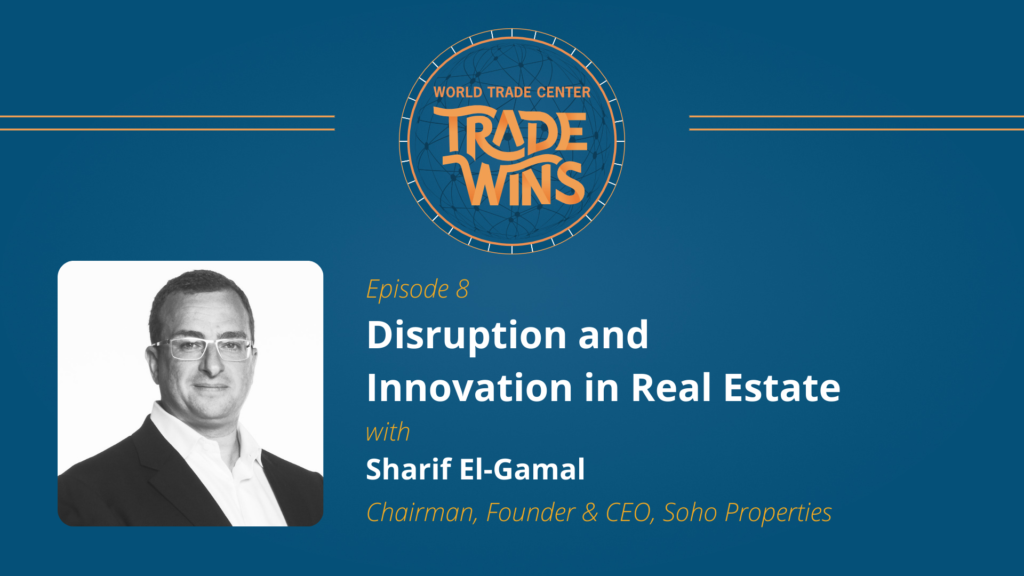Robin van Puyenbroeck 0:08
Welcome to Trade Wins. I am Robin van Puyenbroeck, your host, and I’m excited to present this special series of seven episodes with a set of unique conversations I had with global leaders from the public and private sector during the WTCA 2021 General Assembly. The conversations happened during the last week of April with a live virtual audience from 70 countries. This gave me the opportunity to also poll the global audience on some very pertinent questions. Poll results provided not only further food for thought but also calls to action. Now let’s get started.
Please join me in welcoming Sharif El-Gamal, founder and CEO of Soho Properties here in New York. Sharif is one of those inspiring globetrotters who not only is a great real estate developer, but also an entrepreneur who’s always looking at the next opportunity. Sharif will discuss his thoughts on disruption and innovation in real estate. He is, of course, with a very eager audience having over 160 World Trade Centers represented here at our conference. All of our World Trade Centers are unique real estate developments in their own right. Sharif, welcome. I will not take a second more of your time. Over to you.
Sharif El-Gamal 1:25
Good morning, Robin, and good morning everybody. I’m very honored and excited to be with all of you that have joined in today from around the world. Congratulations on the gathering of your Assembly this year. It is under very unique circumstances that we are all getting together again. The first thing I would like to ask us all to question ourselves about is how we have reacted as business owners, leaders, and employers concerning what is potentially the greatest disruption that we will ever experience in our lives and being a real estate developer, investor, and landowner in what I consider the global capital of the world where we are still reeling from the effects of COVID and from the challenges that we have all faced. I think that question is extremely relevant today as we move into a new era of communication and a new era of interaction. The option of working from home today and working from the beach or working from various parts of the world has opened up our eyes that there is a revolution in how we are interacting and how we need to evaluate our spaces today as the world is coming back into a more symbiotic ecosystem together. We have to start redefining our workplaces to start attracting and welcoming back our employees, our clients and various people. The majority of you have staked the ground with this organization and are thinking about what’s in the future and what’s on the horizon. The evolutions that we have experienced have cemented that we need to repurpose our buildings, that we need to repurpose our hotels, that we have to rethink our condos, that we have to rethink our infrastructure, and that we have to understand how cities are going to bring back all the people that left to the suburbs and the rural areas where they reconnected with nature and reconnected with different environments. I believe that this year we are going to start seeing the largest return of businesses back to their original workplaces and people coming back to the cities that they deserted a year ago. For us to reconnect, restimulate, and re-energize all the people that are going to start flocking back to the cities, we need to start repurposing and rethinking our spaces and what is that going to mean for the office spaces, what is that going to mean for hotels, what is that going to mean for residential buildings. Ultimately, the infrastructure is going to need to be modernized as we are experiencing revolutions around clean energy. We are witnessing a disruption right now in our mode of transportation with electrical cars and with all the technology that has been submerged into our lives at such an incredibly rapid and accelerated pace. Offices today need to start providing various amenities and meeting spaces that will help foster connectivity amongst people. We need these social interactions to stimulate creativity to welcome the new workforce that’s coming in. The culture building cannot happen over a Zoom call; the culture building cannot happen over a phone call. We will need our physical spaces to build those teams and those various cultural initiatives. With respect to the residential component, whether it’s rentals or condos, I think our amenity spaces are going to need to change in a very big way. There are going to need to be wellness rooms and we’re going to need to start thinking about having facilities that will almost be like co-working spaces where people can walk down from their apartments and immediately plug into a space in their building or in their ecosystem that’s walking distance from their apartment to connect into an environment that will be an extension of their home, but it will be a work environment, a collaborative work environment where they can invite others to come into meetings. The digital association that’s also going to be required in the amenitization of buildings is something that we are studying aggressively right now as an organization as we have a significant condo project that we are debuting later this year. We feel that the spaces now are going to need to be larger overall on the office and residential side. We are also 40 days away from opening up the first resort in Times Square. This resort is an urban resort and it’s the absolute ode to escapism — Margaritaville. We’re nervous and we’re excited as we are about to open up a hotel and resort that will be right in the heart of Times Square on 40th and 7th. I’m excited to invite every one of you to come to our opening and visit us in the next couple of months. Please come to New York. I know that Broadway is officially going to be opening in September. Our dining restrictions are getting lifted on May 5, so there are a lot of exciting things happening around New York. When we developed and designed this hotel, we thought about what a hotel and resort is going to look like and what it needs to provide in a post-COVID era. We can’t wait to debut it to you. We’re excited to have every one of you visit it. Lastly, hotel environments are going to need to rethink how they cater to clients as they come in. What attracted us to the Margaritaville brand is that it has a culture and an identity that was built around seducing the imagination of individuals through providing them an escapist, Caribbean type of environment. I’m using Margaritaville as a brand that nailed it and hit it out of the park of being able to connect and attract a cult-like loyal following.
Sharif El-Gamal 9:21
Other brands also need to start thinking about what is going to be their differentiator as they start opening up their hotels and resorts around the world. People aren’t going to want to go to graveyards anymore. People aren’t going to want to go to hotels that are just rudimentary in the services and the offerings that they have. We’ve had enough of being cooped up and inside for so long. What’s akin to where we are today and where we were 100 years ago with the Roaring Twenties of the 1920s is that I do believe that we are about to experience an absolute global boom in travel and leisure. Even if you can’t fly, you’re going to drive somewhere. As cities and countries finally open up their borders and open up their doors, people are going to want to start visiting their families, visiting their loved ones, visiting their friends. Hotels need to start getting ready for that possibility of being able to cater and provide other services that we were not providing in the past.
Sharif El-Gamal 10:45
The last and most important concept, I believe, is the integration in our infrastructure on a national level and here in New York of real digital services — whether it’s renewables, whether it’s various means and methods of further helping to accelerate how we’re going to be transported into different communities. We haven’t been sitting in traffic jams for the last year. We’ve been able to have the comfort of getting on our computers and dialing into the various portals. I don’t think that we are going to tolerate any more traffic as human beings. We’re going to start realizing that our time, which is our most important commodity, needs to be respected differently with the abundance of technology that’s available to us. I think the real winners are going to be the ones that understand how to help integrate and redefine the infrastructure patterns that have become a part of our DNA and incorporate digital and a renewable component to it. Because today, if we remember, the typewriter was a tool for many of us. I only used it for a little bit of time in my life when I was quite young. I believe that cars of today are akin to the typewriters that were around at that time. We’re about to witness, I believe, a transportation revolution. I think that from a real estate aspect there is going to be a requirement that we rethink our roads, our transportation systems, and how does that ultimately build into this new ecosystem of living, working, and playing.
Robin van Puyenbroeck 12:48
Well, Sharif, fascinating. There is much good food for thought here. First of all, I’m very much looking forward to seeing Margaritaville in Times Square open. I say this with the greatest admiration for how you managed the construction and the completion of this grand project right in the middle of this pandemic. I am very excited to see this come to fruition. Any questions, please put them in the Q&A box. We will also put up a poll and the two questions are, “Will commercial real estate bounce back?” The second question is, “The embracing of sustainability and safety will be critical success factors for future real estate developments.” This is something, Sharif, that you just mentioned — the future of mobility, the future of transportation. How do you see the impacts of sustainability? It’s a very broad notion. But if it comes to real estate developments in the future, will sustainability, safety, health in the workplace become a key success factor for projects?
Sharif El-Gamal 13:45
Oh, 100%. I think that in order to be competitive today, consumers are asking real questions about what is the energy that’s coming into a building? What are the various filtration systems that are coming in? With the technology that exists today on our mobile phones, I believe that we are going to become more advanced and more systemized in how we walk into a space and how we are going to start designing buildings and master plans around communities. Electric cars are the future. Today, when you’re building a master community or you’re looking at a mixed-use facility, it’s going to be inherent upon you to start thinking about renewable energies and how can you incorporate that to be more than 50% of the production of your energy that’s coming in — whether it’s solar, whether it’s wind, whether it’s various storage vehicles that are going, the storage units for electrical energy that are going to be coming in. I think that’s going to be one of the first questions that we’re going to question ourselves as developers because we’re not going to want to pay the excess energy costs. I think the second thing that is also going to be important is our monetary systems. Cryptocurrency is here to stay. It’s not anymore a fad or a product or a currency that cannot be recognized. I think we need to adopt cryptocurrency in our developments — whether you’re buying a condo, whether you’re leasing a space, whether you’re transacting in a community. I believe that being able to provide a tenant or being able to provide a business the ability to transact in that currency is also going to make you a differentiator and give you another plus. This last year has made us rethink and relearn the connectivity that we have to our portable devices and the interactions that we’ve had. Those are going to need to spill over into new communities and new buildings as they’re built. There’s going to need to be a cultivation of environments that are conducive to extensions of your home, whether they’re in the office. People aren’t going to want to go back to the normal cubicle that they were in. Those days are gone. That will not be competitive anymore.
Robin van Puyenbroeck 16:39
Yes. That’s another notion. You hit really on the spot on the notion of purpose. I’d like to sort of dig a little deeper into that. What is the purpose of the place, the purpose of the workplace? We talked about flexibility, creativity, culture and safety. How can our World Trade Centers be ahead of the curve here? What conceptually could the role be of the World Trade Center in defining that purpose of place, be it amenitization of buildings or be it co-work spaces in a new format? Give us something — what vision, what future can our World Trade Centers project here and work on getting started to be ahead of the curve?
Sharif El-Gamal 17:22
Well, I think you guys have a tremendous advantage with your global organization, first of all. I think that what has been established with the World Trade Centers Association is unlike any organization in the world. Having this community that has been established around the world gives everybody the ability to, first of all, share ideas and get real, live information of habits, of occupancies, of forums that are happening. I think that the sharing of information among the organization is, I think, the first key component that the sharing of information and just being able to tap into various metrics of occupancy, of vacancy, of who’s starting to come back, what is the demographic of the businesses that are coming back? I think that information is key to making decisions. Whether you have vacant space or whether you’re fully occupied right now, I feel that the most important component is rethinking the amenity space. There has to be a robust amenity package within a portfolio that isn’t just a traditional amenity package. It needs to feel like an extension of your living room. There needs to be real rec rooms today that compete with a great gym. One that we have here in New York is Equinox. I think that today the facilities are important because our bodies are the most important engine that drive everything, so we need to have recreational facilities and gyms that are cutting edge. I also think that with what we’ve all experienced, there needs to be medical and wellness centers that are also incorporated where people can immediately get a perspective if they need it — and it needs to be holistic. It’s not just physical, but it should also incorporate mental wellness. I think that if we’re able to provide that 360 holistic experience where somebody can walk away from your desk and be able to go into an amenitized space that is not just for his office but is for other tenants in the building and having that recreational and that wellness space, we’re going to find that the tenants and the workers are going to want to reconnect with these environments because they’re not going to find that at home. We as landlords, particularly in the office space, need to be able to provide an experience that you’re not going to find sitting at home.
Robin van Puyenbroeck 20:21
Yes, absolutely. An important question now, Sharif, we talked about differentiation and brand identity. You mentioned licensing like with Margaritaville. Our World Trade Centers are also licensees, this is a licensed brand. Talk to us a bit more about the importance of brand identity and what it can do and the notion of licensing?
Sharif El-Gamal 20:45
Well, I think that that’s, again, one of the greatest differentiators that this organization has — being able to have the brand of the World Trade Centers Association. That affiliation for a tenant or a user or for somebody that’s coming into a space that’s being provided by the organization elevates that brand, ultimately, into an elite, global standing. I think that you will find, especially here in New York with the World Trade Center, some of the most important tenants have flocked into that. That needs to be amplified when you’re showcasing your product. It’s an absolute differentiator, Robin. People flock to brands and this is an elite, global brand that represents excellence. It’s the ability to connect with a global community. I don’t know another organization that’s as vibrant or as well diversified as the World Trade Centers Association. Being able to leverage that as a tenant would exponentially give more power and more opportunities at the end of the day, no matter what business you’re in.
Robin van Puyenbroeck 22:04
Yes. We’re growing rapidly and further diversifying our network and many new licensees have joined us recently. If anyone is looking to partner with a developer and investor, Sharif, on a World Trade Center project, can they call you?
Sharif El-Gamal 22:18
I would be honored. I would love to be of service. I think that the perspective and the know-how that we’ve established here in New York for the last 20 years is shareable and duplicatable anywhere in the world. I’m very keen on learning more about Africa and other parts of the MENA region. I feel that is a real value-add place around the globe today. We would love to participate, give a New York City perspective from this concrete jungle where we’ve been playing and working and building for the last 20 years. I think it would be very fun and exciting.
Robin van Puyenbroeck 23:01
Yes, that’s good to hear. Your phone will be ringing, I think. Next year, our General Assembly will take place in Africa. The next year will be built around the pivot towards Africa. I agree with you, this is a continent with tremendous opportunity. Sharif, this final question is an open question. If you were to do a dream project, a visionary project, what would it be and where would it be?
Sharif El-Gamal 23:30
Wow, that’s a really tough question..
Robin van Puyenbroeck 23:35
Don’t think about the financing aspect or the bankers at this point.
Sharif El-Gamal 23:40
No budget, no financial limitations. I would love to build an all-encompassing community where a project that I think is very intriguing, something that I would love to do, and something that we spent a lot of time thinking about. It would focus on Africa because I spent a lot of time thinking about this. I would love to build an Africa house in New York City. I believe that the United Nations, when it was built, really helped bring the countries of the world together into New York. When that happened, it increased trade. When we have the UNGA week here in New York City, it’s the greatest assemblage of leadership around the world. I thought to myself that if we could build an Africa house, a house that would be on par with the highest technology and representing every single country in Africa and representing all of the opportunities that exist within that country into an ecosystem where you would be able to represent everything from South Africa to Morocco to Mauritania to the Congo to Nigeria. Forgive me for the ones that I’m missing, but essentially grabbing every country in the continent of Africa and giving them a full floor with the most up-to-date technology where an investor, a family could learn more about that country. But where trade and business would happen in the capital of the world. New York pre-COVID had over 131 million visitors and tourists and people that come to it. There is no gathering of people greater than in New York. Having that type of portal or window into the continent would be invaluable. That’s a project that I am thinking about and dreaming about.
Robin van Puyenbroeck 26:01
Yes, take note. I remember we have talked about that in the past. We’ll see. I think it’s a great vision. Thank you so much, Sharif. Let’s just quickly look at the poll. Question one was, “Commercial real estate will bounce back, agree or disagree.” Nobody really disagrees, 43% is right in the middle, and about 18% strongly agree. The trend is positive for commercial real estate to bounce back. And then whether embracing sustainability and safety will be a critical success factor for the future of real estate developments — it’s 50% strongly agree and 50% agree. That notion that you brought up about sustainability and whether it’s to do with mobility and repurposing of buildings is the future. With that, thank you so much, Sharif, for sharing your vision and insights here on the future of real estate and especially on so many creative ideas. I have a feeling you will be joining us sooner than later as a licensee as a World Trade Center licensee as well. Thank you so much.
Sharif El-Gamal 27:02
Robin, thank you for having me. I wish you all the best of luck as you continue your Assembly and I’m confirming my RSVP for your event in Africa next year, Robin. You can count on several properties being a part of that.
Robin van Puyenbroeck 27:16
Done, done and done. Thank you, Sharif.
Sharif El-Gamal 27:18
Thank you, guys. All the best.
Robin van Puyenbroeck 27:19
I hope you enjoyed this special episode from our General Assembly. Make sure to tune in for all of the episodes. Thank you for listening.






